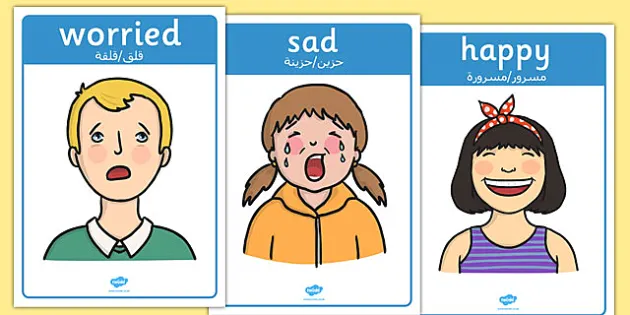Expressing emotions and feelings in Arabic is essential for effective communication. Let’s explore some common phrases and words to describe different emotional states:

- سعيد (sa‘eed): This word means “happy” or “joyful” in Arabic. Use it to express a state of happiness or contentment. For example:
- “أنا سعيد لرؤيتك اليوم.” (Ana sa‘eed liru’yatika alyawm.) – I am happy to see you today.
- حزين (ḥazīn): Meaning “sad,” it’s used when someone is feeling sorrowful or unhappy. For instance:
- “هو حزين بسبب رحيل صديقه.” (Huwa ḥazīn bisebb rahīl ṣadiqihi.) – He is sad because of his friend’s departure.
- غاضب (ghāḍib): Use this term for “angry” or expressing annoyance or anger. Ask:
- “لماذا أنت غاضب؟” (Lemādhā anta ghāḍib?) – Why are you angry?
- خائف (khā’if): To convey “scared” or “frightened,” use this word. For example:
- “الطفل خائف من الظلام.” (Al-ṭifl khā’if min al-ẓulam.) – The child is scared of the dark.
- متحمس (mutaḥammis): To show enthusiasm or excitement, describe someone as “excited.” Say:
- “أنا متحمس للسفر إلى بلد جديد.” (Ana mutaḥammis lil-safar ilā balad jadīd.) – I am excited to travel to a new country.
- مرتاح (murtaaḥ): This means “comfortable” or “at ease.” Use it when someone is feeling relaxed:
- “أشعر بالراحة عندما أكون في المنزل.” (Ash‘ur biraḥah ‘indamā akūn fī al-bayt.) – I feel comfortable when I am at home.
- متوتر (mutawattir): When someone feels “nervous” or “anxious,” use this word:
- “أصبح متوتراً قبل الامتحان.” (Aṣbaḥ mutawattiran qabl al-imtiḥān.) – He becomes nervous before the exam.
- مندهش (mundahish): For expressing the feeling of being “amazed” or “astonished,” use “mundahish”:
- “كان مندهشًا من جمال الطبيعة.” (Kāna mundahishan min jamāl aṭ-ṭabī‘ah.) – He was amazed by the beauty of nature.
- قلق (qalīq): This word is used for “worried” or “concerned”:
- “الأم قلقة على صحة ابنها.” (Al-umm qalīqah ‘alā ṣiḥḥat ibniha.) – The mother is worried about her son’s health.
- متفائل (mutafa’il): When someone is feeling “optimistic” or hopeful, “mutafa’il” is the suitable word:
- “هو متفائل بمستقبل أفضل.” (Huwa mutafa’’il bimustaqbal afdal.) – He is optimistic about a better future.
- محبط (muḥbaṭ): To express “disappointed” or “frustrated,” use “muḥbaṭ”:
- “شعر بالإحباط بعد فشل المشروع.” (Shā‘ir bil-iḥbāṭ ba‘da fashal almashrū‘.) – He felt disappointed after the project failed.
- مشتاق (mushtāq): To express “missing” someone or feeling “long